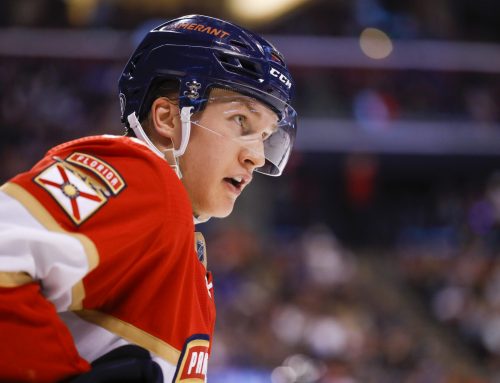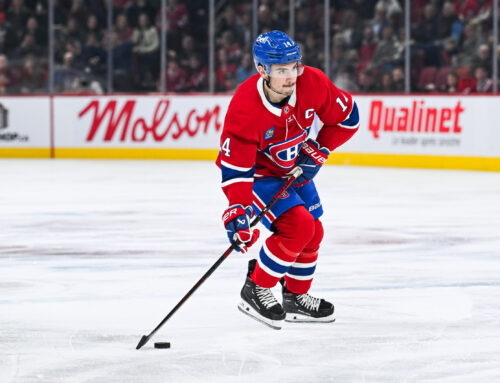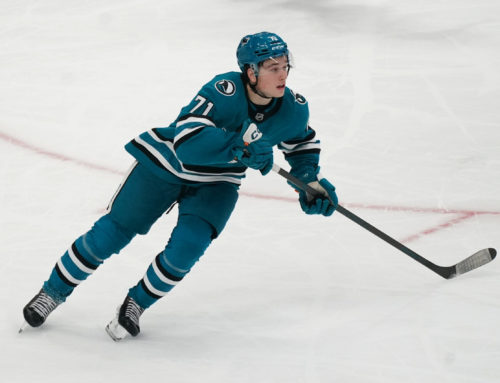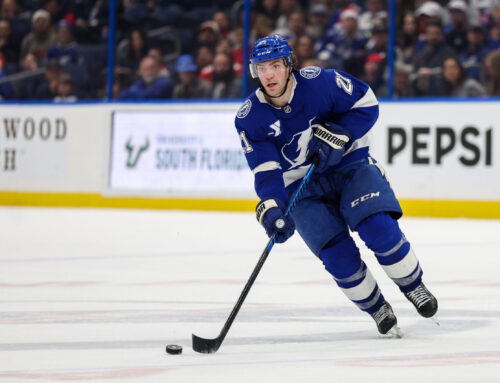
Who has the better fantasy hockey value – Bobby Ryan or Corey Perry?
Ever since Bobby Ryan was dealt to the Ottawa Senators I have been pondering the fantasy implications. Obviously this should boost Ryan to new levels but how high can he go? On the flip side, what does this do to Anaheim now that they have finally split up their big three? Is it possible that Ryan's scoring potential exceeds that of former teammate Corey Perry now that he is out of Perry's shadow? These questions are what Cage Match was designed for. Let's do this.
Before we begin it should be noted that this has to be a scoring value only. If we moved this to a rotisserie setting we'd have endless debates about just which categories to include. Both guys are roto-monsters and depending on the settings one could be ahead of the other. I don't want to debate settings so let's stick to the raw scoring.
I've heard it mentioned a few times (I myself even mistakenly mentioned it) that Ryan is now a top line player now that he is in Ottawa. He'll definitely be a top line player but this is nothing new for Ryan who has spent over 50% of his shifts with Perry and Ryan Getzlaf on the Ducks top line since he became a pro in 2008-09. What will change is that Ryan won't bounce around the lineup quite so much in Ottawa. This means no more experiments with him at center. More importantly, however, it means Ryan will get back to being a top line power play option.
By now I'm sure you know the story. Bobby Ryan broke in as a full time NHLer in 2008-09 and wowed us with 31 and 57 points in 64 games. He was a point per game player in the making. Teaming with Getzlaf and Perry to form one of the most physically dominant lines in the game it was a matter of when, not if, Ryan broke the 80 point plateau. Ryan didn't play a lot that season, which hinted at an endless amount of potential should he become a full time top line player.
Of course, what most didn't notice is that when Ryan did play it was almost always with the best the Ducks had to offer, including plenty of top line power play minutes on a Ducks squad that possessed two future Hall-of-Fame defensemen in Chris Pronger and Scott Niedermayer and scored on the power play at a top five rate. Of Ryan's 57 points that season 23 came on the power play, where he was playing 2:42 per game.
What also went unnoticed was how Ryan lapped up power play time and points while covering for an injured Teemu Selanne who missed 17 games mid-season and played a minor role for some time once he came back.
A similar trend continued in 2009-10. Ryan skated with Getzlaf and Perry a ton and saw a boost in minutes, especially when Selanne missed time (only 54 games played that season for Selanne) but his production sagged a bit on a per game basis mostly likely driven by some natural regression in shooting percentage. His 2008-09 shooting percentage of 17.8% was much too high to be sustainable. As it turns out his diminished 2009-10 shooting percentage of 13.6% falls almost exactly in line with his career average of 14.1% – that's regression to the mean personified, even if the mean hadn't technically been established yet.
Still, Ryan was a top line mainstay and seeing plenty of power play minutes. More NHL experience and a continued presence on that Ducks top line should surely have brought Ryan to the point per game plateau but it was not to be. 2010-11 was Ryan's best season as a pro but he still stumbled to 71 points because of a complete banishment from the Ducks' top power play unit. Selanne finally stayed healthy for a full season and while Ryan was able to ride great seasons from Getzlaf and Perry by skating alongside them for over 78% of his even strength shifts that season, his power play production fell to just 11 points as he skated just 2:24 per game on the power play skating with an assortment of miserable players like a pre-Toronto Joffrey Lupul, a past-his-prime Saku Koivu, a Jason-Blakey Jason Blake and Ryan Winchester.
Ryan did still skate a ton on the power play with Getzlaf and Perry and even Selanne but his minutes overall were down and so were those great opportunities with the big guns. Add in a little puck luck (or lack thereof) and Ryan just couldn't put it together on the power play.
Then the downward trend began for Ryan. 2011-12 was a down year in Anaheim all around as Lubomir Visnovsky struggled with injuries and the Ducks offense plummeted to 24th in the league, while their power play fell to 21st. Getzlaf and Perry both regressed immensely and while Ryan managed 31 goals he suffered from their struggles as well recording just 26 assists for 57 points total, a real step backward. Ryan was still seeing plenty of time with Getzlaf and Perry but the power play time was drying up to an average of 2:09 per game.
2012-13 was essentially rock bottom for Ryan. He scored just 30 points in 46 games, a 53-point pace. His minutes also fell to just 16:35 per game after averaging over 18 per game the past three seasons and you can bet the power play time fell as well, down to just 1:57 per game. So Ryan was little able to take advantage of skating on a team whose offense rebounded to top 10 last season (2.79 goals per game) and whose power play rebounded into the top five (21.5% success rate).
So what does this all mean? Well Ryan was given good but not great opportunities in Anaheim. In Ottawa the hope is that he sees those great opportunities. Going off of last season's stats won't get you very excited though as the injury-riddled Senators scored just 2.33 goals per game (27th) and scored on just 15.9% of their power plays (20th). Go back to 2011-12, when Erik Karlsson played the full season (and broke out) and the Senators in general had much better health you get a much happier picture.
In 2011-12 the Senators were fourth in NHL scoring (2.96 goals per game) and 11th in power play efficiency (18.2%). What's crazy is that that Senators team was essentially a one-line team with Milan Michalek, Jason Spezza and Daniel Alfredsson combining to score over a third of the team's goals and Karlsson chipping in another 8%. This year's Senators team will be deeper, which should help take some pressure off the top line, where Ryan projects to replace Daniel Alfredsson.
Now, there are still plenty of questions here and I will attempt to answer them:
Will Erik Karlsson be the same after his Achilles injury?
I have no doubts about Karlsson's ability to rebound. Surgeons and surgery methods are so advanced these days and we know way more about rehab that physically Karlsson should be fine. And Karlsson still has that genius mind of his to fall back on. Just look at what he did in the playoffs while obviously limited. Karlsson probably comes back better than ever next season.
Can band-aid boys Spezza and Michalek stay healthy for 82 games?
I doubt it. But if Ryan can mesh with these two for even 60 games you could be looking at 70 points in those 60 games leaving him to score just 12 over 22 with lesser linemates. So he can still theoretically score a point per game even if those guys go down. The more important question should be whether or not these guys can mesh together and they almost certainly should be able to. This is because they each bring something different to the table but together they create a great line with speed, creativity, lethal shooting and now a physical element as well.
And even if they do miss games the Senators have some intriguing, young depth on the roster. Ryan could find some success with the likes of Mika Zibanejad or Cory Conacher for some limited stretches.
How will the team respond to losing their captain?
Probably not well. Alfredsson helped guide a very young team last season and they will no doubt miss his presence. Even though he'd grown limited in his older age he was still pure class and played the right way. He was their best player in last year's playoffs. Hopefully he left a lasting impression.
The good news is that Paul MacLean is still there to provide the team with fantastic coaching.
Can Paul MacLean transition the Senators back into an offensive juggernaut after making a real attempt to drag hockey into the dead puck era this past season?
Like I said, MacLean's a fantastic coach. He'll coach the players he has. Coming into this year those players look like they could score a heck of a lot of goals. No reason to suspect MacLean acquired a taste for sucking the life out of molten rubber.
But so far we've spent about 1,500 words talking about Bobby Ryan and this is a Cage Match where we've barely discussed the other guy – Corey Perry. That's because we pretty much know what we have with Perry at this point.
Perry is an all-world power forward – one of the best in the business for sure. He's also very streaky. A lot of this stems from the inconsistency of his partner-in-crime Getzlaf whose effort shift-to-shift; game-to-game; and week-to-week can often wain. At their best Getzlaf and Perry form a duo that teams cannot stop from scoring and the result can be something like Perry's MVP 2010-11 season where he scored 50 goals and 98 points.
Of course, with the highs come the lows and Getzlaf and Perry are no stranger to the lows. 2011-12 was the complete opposite of 2010-11. Both players struggled with effort, consistency and especially health, ultimately scoring just 57 and 60 points respectively. That's some serious regression.
2012-13 was a bounce-back season for Getzlaf but not so much for Perry as Perry managed just 36 points over 44 games. That's an improvement but not much of one.
At this point Perry cannot be considered a point-per-game player. We know he's capable of it (and more) but eight years in we've seen Perry crack the point-per-game plateau once, which makes it something of an oddball occurrence rather than the norm. And really, at this point we may have as many questions about Perry in Anaheim as we do about Ryan in Ottawa:
How will Perry and Getzlaf respond to their fat new contracts?
We know there is something of an on/off switch for these two. I don't like the notion of giving them each big, fat contracts and then expecting them to go out and earn it with great effort every night. Of course, it is an Olympic year and while these two are practically shoe-ins they may just slough off the notion of mailing it in next season in order to lock up spots on team Canada.
How will Perry perform without Ryan?
We never really asked how Ryan would do without Perry and Getzlaf but his situation in Ottawa looks strong enough that we shouldn't need to ask that question. On the flip side, the Ducks are losing a four-time 30-goal-scorer off of whom they could pad their assist totals.
Jakub Silfverberg is coming over from Ottawa and could be an immediate replacement. He doesn't offer the same physical game but he's a real talent with a lethal shot. We can't be certain about this but he appears to have the ability to replace those 30 goals.
What about the ever-declining Teemu Selanne?
We don't even know if Selanne will be back and if he does return how limited he will be. I'm about ready to write him off, which would be a real blow to the Ducks, especially their power play because he was an integral piece.
*
So what does this all mean? Well, like I said, we pretty well know what we have in Perry. He's good for near a point-per-game and has upside for plenty more depending on motivation and luck (Perry's 17.2% shooting in his 50 goal season was easily a career high). We know Ryan can get to a similar level but we don't know if he can get higher. This season is the test.
Barring some catastrophic injuries I am calling this season a failure for Ryan if he doesn't reach 80 points. This is stupid and arbitrary but I'm doing it anyway because I want to see Ryan get there – because I know he CAN get there. Certainly luck and motivation will play a part of Ryan's success or failure based on my arbitrary benchmark for him. It could be that he has to wait a season or two before it all comes together and he reaches that arbitrary 80-point plateau or even smashes it to smithereens but I'm calling for it this year, because, why not?
Still, I can't advocate taking Ryan over the proven commodity in Perry. This isn't to say Ryan isn't a proven commodity, just that Perry's proven a little bit better. Everything is in place for Ryan to become on par, if not more productive than Perry so I wouldn't go out of my way to get Perry if I knew Ryan would still be there for me but at the same time I wouldn't just trade Perry to get Ryan. If I could get more than just Ryan, I'd do that and figure I'm coming out ahead but straight up Perry is still your guy. Just know that Ryan is right there and there's no shame in treating him as such.
Recent Cage Matches:
| Roberto Luongo vs. Cory Schneider | |||
| Jonathan Drouin vs. Nathan MacKinnon | |||
| Drew Doughty vs. Alex Pietrangelo | |||
| Logan Couture vs. Derek Stepan |





 SEA
SEA NYI
NYI BUF
BUF DAL
DAL
 CBJ
CBJ NYR
NYR ANA
ANA STL
STL L.A
L.A
